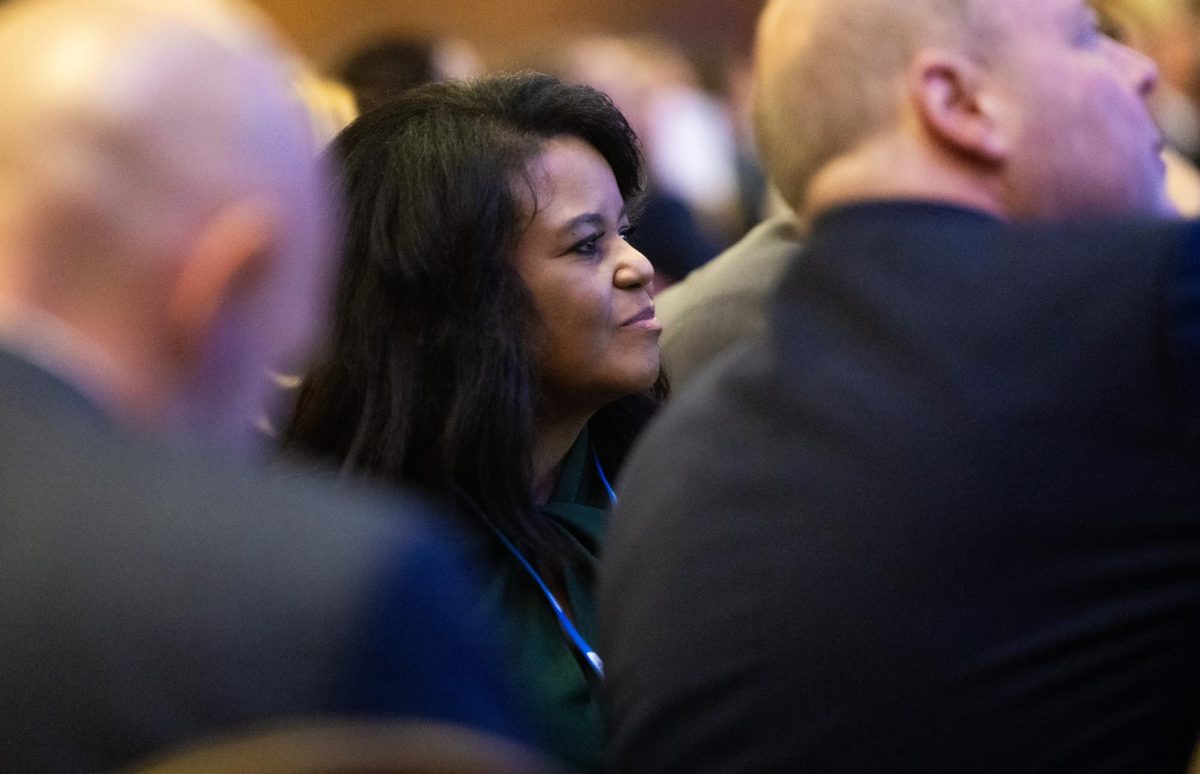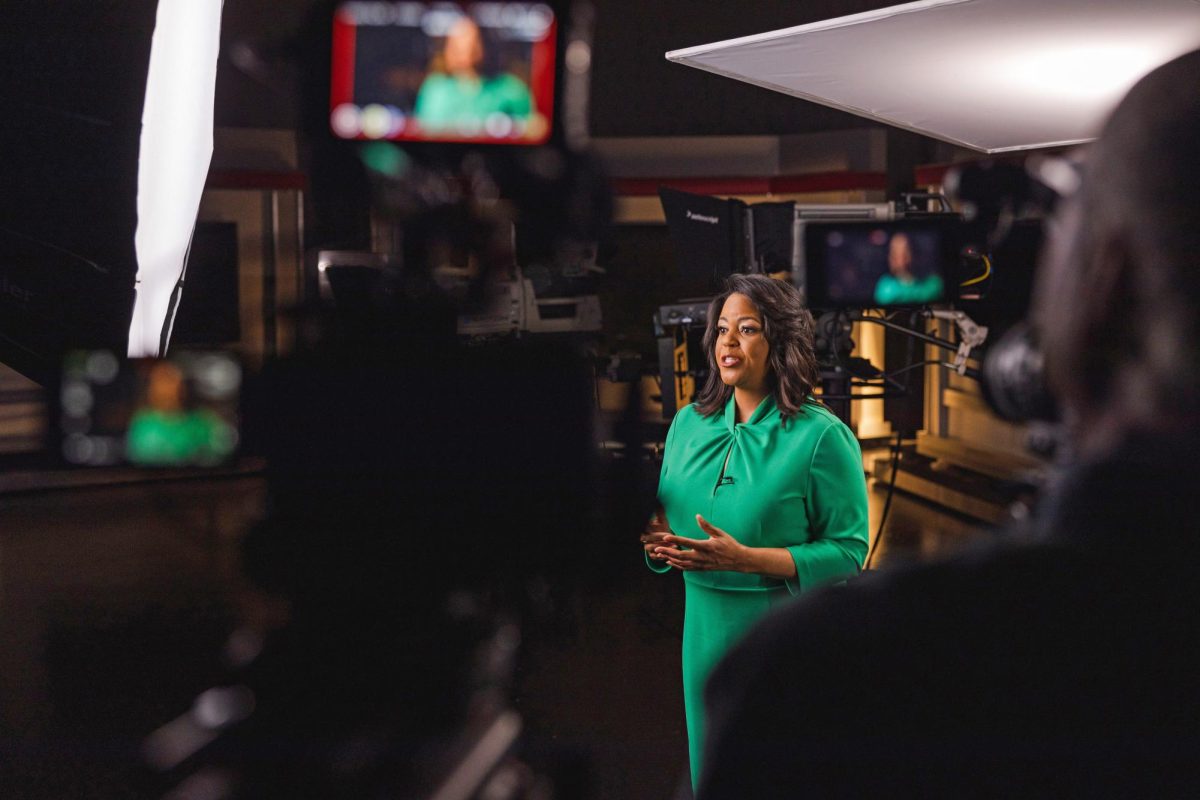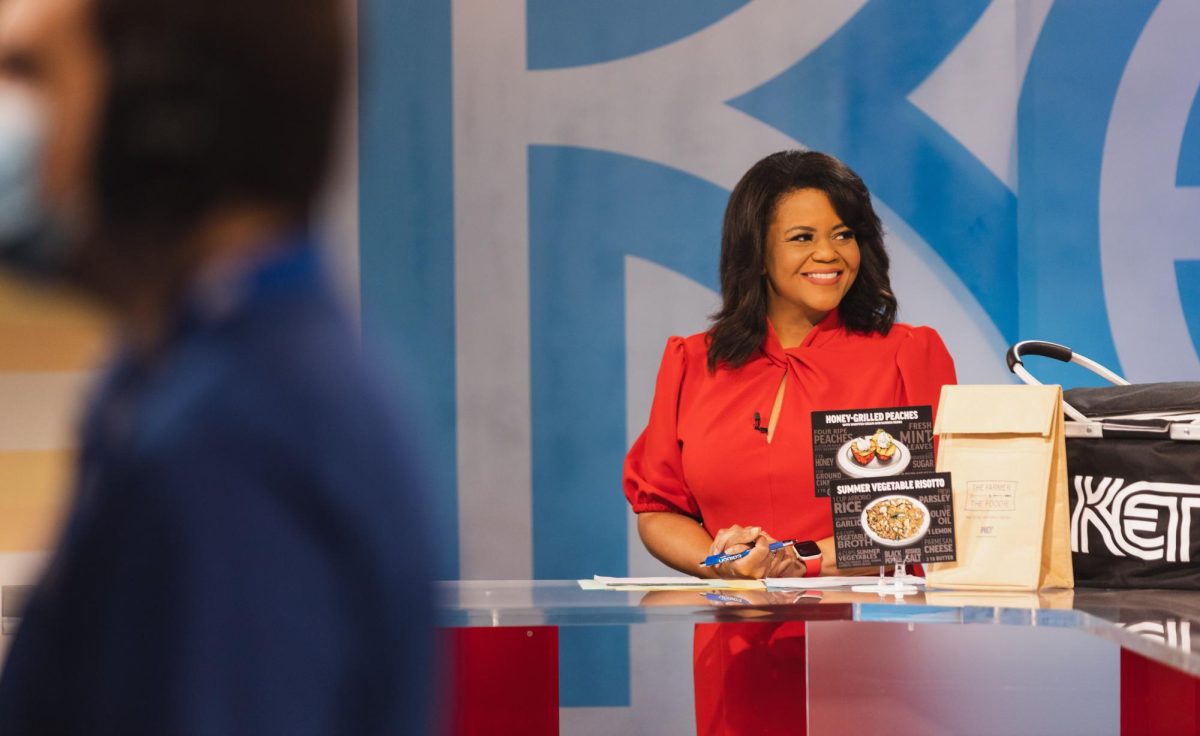During her 25 year career at Kentucky Educational Television, Renee Shaw has solidified her spot in Kentucky not only as a driver of change but as a crucial part of the Kentucky political landscape.
Shaw never thought she would occupy such an important space in Kentucky politics, and when asked about it, she will say, “I still don’t believe that I do.”
It was her growing up in both Tennessee and Kentucky, though, that helped her realize she was capable of occupying a space such as this.
Shaw was raised in Portland, Tennessee, as an only child in a household where public broadcasting was part of not just the daily routine, but of her early education.
“Mister Rogers and Sesame Street and Electric Company, those were my early teachers. My mother and I would watch and we would rehearse the alphabet and my lettersand sounds,” Shaw said. “But I also learned about diversity and appreciating differences … And I love what they did.”
It was this early exposure to public broadcasting and educational television that led her to pursue that as a career when she began her time at Western Kentucky University.
“I’ve always had an affinity for that kind of programming,” Shaw said.

Upon coming to WKU in 1990, Shaw began first volunteering for and later working at the university’s television station. It was there where she found her place on campus and her love for public broadcasting truly blossomed.
“I knew this is where I wanted to be,” she said.
In the communication and broadcasting departments, Shaw found herself surrounded by faculty and staff like former associate professor Sally Ray and Dan Modlin, past news director at WKU Public Radio, who not only challenged her and helped her become the journalist she is today, but who saw in Shaw then that she would become something special.
“Even before I got to WKU, I taught at various universities, and over the years I think most professors would say you’ll have a handful of standout students,” Ray said. “And she was definitey one of the stand out students.”
Modlin reflected this sentiment.
“She was one of those dream students,” Modlin said. “She was there because she wanted to learn.”
Shaw credited professors like Ray and Modlin for teaching her reporing skills and how to write while also introducing her to the world of public broadcasting as a part of it, not just a viewer at home.
“The people who are drawn to public broadcasting just have a heart for serving the community,” Shaw said. “That’s contagious, and I got that bug, and I didn’t want to deviate from that.”
When she came to WKU, Shaw was in search of something to complement her interest and studies in broadcasting. Government and political science fit that bill perfectly.
“I knew when I was coming to Western that I wanted to go into broadcast journalism, but I wanted to also have something that was a specialty or unique skill or set of knowledge,” Shaw said.
It was her first class with political science professor Saundra Ardrey that introduced her to the world of politics, and after that, she knew she had found a new passion.
When she graduated from Portland High School in 1990, Renee Shaw was one of the only people of color and “definitely the only female of color in my [her] graduating class.”
Growing up in what she described as a “very homogeneous kind of community,” it took her arrival at WKU to be taught in the classroom by Ardrey, her first African American educator. It was Ardrey’s mentorship that led her to political science and public affairs.
“Her instruction and her enthusiasm and passion for political science encouraged me to make that my double major,” Shaw said. “After one class with her, I was convinced that that was where I wanted to go.”
Ardrey took Shaw across the country and immersed her in experiences that cemented her love for politics and public policy. These experiences included trips to places like Chicago’s DeSauble Black History Museum and the 1993 inauguration of President Bill Clinton.
“Because we got to engage with high level folks and organizations, it really spurred in me a passion to want to combine what journalism offered in terms of storytelling and what government and political science offered in public policymaking,” Shaw said.
Much like Ray and Modlin, Ardrey knew that Shaw had what it took to go far in her career.
“She was interested in having a foundation for what she reported,” Ardrey said of Shaw. “She was very determined to not only learn the craft but also to learn the political system, the environment so she could better report and interpret who she was interviewing and what she was doing.”
The desire to have that foundation was impressed on Ardrey, who saw quickly that Shaw wanted to know anything and everything she could in order to do her job as best she could.
“She was hungry for information,” Ardrey said.
Modlin, Ray and Ardrey all expressed awe at her work ethic and her determination to do her job well, something that would prove to stay with her throughout her time at KET.
To Shaw, however, this work ethic was second nature and was part of the job. During her time at WKU, Shaw was dedicated to learning as much as she could so she could do her job as best she could. She credits her tenacity on the Hill and the values her education instilled in her.
“I left there feeling empowered to do my best work, not knowing what that work would necessarily look like, or where I would stay, or how long I would stay and all the things that you’re uncertain about,” Shaw said. “But I knew that I had been trained that if you’re going to represent Western, you need to come 100% at it, and to give it all you got.”
Shaw took this into her career because she knew that “half-stepping just won’t do.”
She learned from her mentors and her peers throughout her time at WKU while forming lasting relationships with not only those who taught her but those who learned with her, too.
Shaw talked about a classmate, Brian Huff, who passed away at an early age, just a few years after graduation. Shaw credits Huff in helping her conceptualize success in her career just weeks before his passing.
“He said to me, ‘you know, Renee, the money and status will come. Just hang in there and do the good work,” Shaw said.
She took these words to heart throughout her career, and she continues to do the good work each and every day on the job.
Shaw’s first day at KET was on Jan. 6, 1997, but her arrival there almost happened by accident. Her boss at the time spoke with Jenny Fox, executive assistant to KET’s executive director at the time, giving her Shaw’s name for an opening at the network. Shaw interviewed for the job, and just days later she received the offer. She has never looked back.
“The transition from Western to KET couldn’t have been smoother because I wasn’t trying to make something happen,” Shaw said. “I hadn’t looked for a job, the job found me. And the perfect job found me.”
Immediately, Shaw found something at KET that was special to her, something worth staying in Kentucky for. Between her arrival at KET and her time at WKU, she knew Kentucky was where she wanted to be.
“I was born in Tennessee but I grew up in Kentucky,” Shaw said. “My maturation as a woman, as a journalist, as just a human being, as someone who is concerned about the state of world and state and local affairs, my identity came to be in this state.”
As a Black woman, she knew that girls like her from Portland and from other small rural areas needed a figure like herself to succeed so they knew that they could succeed, too.
“It’s just as noble to stay in a place that needs to see people like you stay in the place,” Shaw said.
Not only was Shaw given an opportunity to show others like her that their possibilities are endless, but she was given a stage, and she was grateful for that.
“Kentucky had embraced me and allowed me to have a platform,” she said. “It was worth staying around and thanking them for it.”
Shaw sees her work at KET as educational and informative. To her, it is important for her viewers to know the issues, which requires her to know the issues. She reads the news often, reading things like the Louisville Courier-Journal, the Lexington Herald Leader, the Washington Post, the Wall Street Journal and more.
In reading news from all different places, Shaw makes sure that she is receiving an education in the happenings of Kentucky, the United States and the world that is not purely biased on one end of the political spectrum or another, but is instead balanced to reflect what her viewers want to know. In doing this, she is able to focus on educating her viewers on the issues of the day.
In going into each show or a debate she has this in mind: “What is it that I need to learn and that the viewer needs to learn, first and foremost?”
Shaw recognizes, however, that her role should not go beyond education. To her, journalism, especially local journalism, is about making sure everyday people know what they need to know.
“My job isn’t to tell you what to think. It’s to tell you what to think about,” Shaw said.
Preparation is key in everything Shaw does. To ask Kentucky’s government officials and candidates the important questions, she must first have an understanding of the issues. When beginning this research, as she puts it, “you have to be smart enough to know how unlearned you are.”
In this mission, neutrality is important to Shaw. Her neutrality and her ability to stay unbiased in moderating political debates and discussions surprises many. In an interview about Shaw for Kentucky Living in February of this year, U.S. Rep. Morgan McGarvey, D-Louisville, remarked that after working with Shaw for over 10 years, he is still unsure of whether she is a Democrat or a Republican. Ray reflected this sentiment.
“I’ve known her all these years, and I have no idea what her political allegiance is,” Ray said. “That ought to tell you something. That she can stay neutral and objective in her ability to gather the news and report it.” Shaw’s commitment to being nonpartisan in her work shows.
“I am neither Democrat or Republican,” she said, in response to McGarvey’s comments.
This commitment to neutrality allows her to remain committed to being prepared and to educating the people of Kentucky each time she goes on the air.
“Everything that I try to do, I try to go into it saying ‘now if this is my last show, this needs to be my best show.’ Or my best program, or the best speech I give,” Shaw said. “And I don’t always reach that mark, but I need to put as much preparation into each effort as is required.”
Shaw has had a front row seat to Kentucky politics for over two decades, and the 2023 gubernatorial election is no different. From her time moderating KET’s nightly news program “Kentucky Edition,” the weekly public policy discussion series “Kentucky Tonight” and the network’s political debates during primary and general election seasons Shaw knows Kentucky’s politics.
Citing Beshear’s high approval ratings among both Democrats and Republicans in the commonwealth despite a GOP supermajority in the General Assembly, Shaw explained that the 2023 Gubernatorial Election in Kentucky is a “bellwether” for national Democrats in 2024.
“If he can overcome and he can survive to a second term, it is a bellwether, an indicator, of how Democrats may perform in 2024,” Shaw said.
While Kentucky is politically unique, however, Shaw was careful not to over state the commonwealth’s importance.
“There are a lot of dynamics unique to Kentucky that may not translate nationwide,” Shaw said. “We don’t want to overstate what it could indicate if Beshear is indeed victorious, but there’s a lot of lessons we can learn as we watch this race unfold.”
Shaw stated, however, that she does not like to predict the outcomes of races – that is not her job. Her job is to look at what happens in an election to see how it impacts Kentuckians and how it could impact their voting behavior the following year.
“What I like to take time to do is look at where we are, and when we get to Nov. 7 and beyond to really dissect what worked and what didn’t work. And to talk to voters, real people, not just political operatives to see what’s really on the minds of Kentuckians,” Shaw said. “The lessons we learn about how to campaign, what messages to work, what issues resonate and the ground game can be highly instructive for 2024.”
To this day, Shaw credits WKU with shaping her as a person and as a professional and for giving her the knowledge necessary to understand the commonwealth’s politics as she does, and for that, she will always be thankful. Thanks to her time on the Hill, she was able to become the person that she is and to occupy the space that she does, and without her formative years at WKU, she would be in a completely different place.
“Western taught me about being a good citizen,” Shaw said. “Not just a professional, not just a journalist or someone who is in the public policy space, but just being a good citizen and being an informed citizen and a connected citizen.”
It is this development as a person that she hopes every Hilltopper will graduate with because it has been so invaluable to her. Being present and enjoying the time on the Hill is what helped her become who she is today, and it is the advice she gives other Hilltoppers.
“Your college experience is so rich and it stays with you for the rest of your life. And you really come into your own,” Shaw said. “So I would say enjoy every step up the hill, don’t get too anxious about your future … You always want to know that you’re doing what you’re sup- posed to be doing, but while you’re doing it, stop asking yourself
that question. Just do it.”
Many who know Renee Shaw will say that she is more than deserving of her induction into WKU’s Hall of Distinguished Alumni, because the work she has done throughout her career has been meaningful and important for every Kentuckian.
“I’m just so proud of her,” Ardrey said.
Ray and Modlin echoed this sentiment.
“There are a lot of people who de- serve to be in [the Hall of Distinguished Alumni], and I can’t think of anyone more deserving,” Modlin said. “She has been such a great example of how a student can come into WKU and make the most of every opportunity and make a real career for herself.”
“She shows us all what you can achieve with hard work, and I’m so happy that the university recognized that and they saw fit to honor her with the highest award they have,” Ray said. “A lot of institutions would love to count Renee as one of their alumni, and we got her. And that’s pretty special.”
Shaw learned from her mentors and from her time at WKU that she wanted to make a positive impact on the lives of the people around her, and that public policy and broadcasting was the way she wanted to do that. She has come to occupy a space in Kentucky’s political space that no other could occupy – educating countless Kentuckians on the issues of the day while holding officials and candidates for public office accountable for their actions.
“I didn’t want to be just successful, I wanted to be significant,” Shaw said.

In her 25 years at KET, Shaw has grown aware of the role she plays and her position in Kentucky’s political discourse. Kentucky has grown to respect Renee Shaw because of who she is and what she stands for, and for Shaw, that is the best compliment she could ever receive.
“The highest compliment that I can ever get is when people say ‘I trust you. I trust you to tell me the truth and I trust you to be fair. And I trust you to do your homework and to be prepared,” Shaw said.
During her time at KET, Shaw has: won three regional Emmy awards; been recognized for her mental health advocacy; been named a Kentucky Colonel twice, once by a Republican governor and once by a Democrat; been inducted into the Kentucky Civil Rights Hall of Fame; and much, much more.
At this point in Shaw’s career, however, it is her induction into WKU’s Hall of Distinguished Alumni that means the most to her.
“Because I value and cherish my experience at Western, for people to have petitioned on my behalf for my induction, that is extremely meaningful because it’s personal,” Shaw said. “To have people who were part of my collegiate formative years see fit for me to be part of this distinguished society, I don’t take that lightly. I will treasure that always … It’s pretty special.”
Commentary editor Price Wilborn can be reached at edwin.wilborn835@topper. wku.edu. Follow him on X @pricewilborn.





